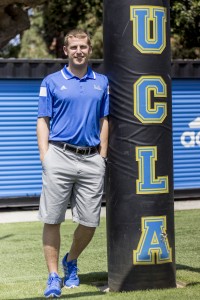With the sun in his face, fourth-year physiological science student Joe Douglass looked up at the Acosta Athletic Training Complex.
“It’s been a long journey,” Douglass said. “I’ve spent a lot of time – put in a lot of hours – in that building.”
The 6-foot senior isn’t a Division I athlete, even though his Bruin athletic gear suggests otherwise. His days of competitive football, baseball and soccer are long over, and he stopped playing club lacrosse after his second year at UCLA. Maybe he gets to play some pickup basketball or sneak in a round of golf if he’s lucky. Yet, over the past three years, Acosta has become his home.
Douglass, a third-year member of the UCLA Undergraduate Sports Medicine Internship Program, has spent countless hours in the complex – observing, learning and practicing what he said has quickly become his passion.
Since starting the “professional phase” during his sophomore year, Douglass has spent every quarter – even summers – working with a wide array of athletic teams. His assignments included two offseasons with women’s soccer, a winter with swim and dive and two full seasons with one of the most time-intensive UCLA sports: football.
Football seasons were five-month time commitments stretching from the training camp in August to as late as an early January bowl game. Some days began with early practices, while others extended late into the night. Beginning the summer of his junior year, Douglass said he averaged about 30 hours per week with the team. Those contributions did not go unnoticed, said Anthony Venute, the head football trainer.
“He gains more and more responsibility the longer he’s here. This year, Joe was one of our older students, so we used him a lot more as far as day-to-day stuff,” Venute said. “We counted on him for last-minute changes for anything, (and) he always stepped up to the plate.”
In-game duties ranged from running water bottles onto the field during timeouts to shadowing a staff athletic trainer. Some of the jobs were hands-on, like working on players as they sat on the bench. Some jobs were as simple as filling up water. Douglass did all of them, steadily learning how to handle all of the moving parts.
While he said that the work was hard, Douglass added that some of his favorite moments came on the football field. He accompanied the Bruins to Nebraska in September 2013 for his first away game, about one week after the death of UCLA wide receiver Nick Pasquale.

“It was a very emotional game and a very emotional time, but we had a great comeback win that day,” Douglass said. “It’s really cool to be involved in a large team like that, being able to travel and really just feeling like you’re part of the team.”
Douglass went to five more road games over the next two seasons, including a bowl game victory to finish each year. Every winter, he packed up the football equipment and transferred over to women’s soccer, and this past year he added swim and dive to his duties. While the other sports entailed less travel and fewer hours, Douglass was able to bring his improved treatment skills and rehab knowledge to more athletes.
“Anytime you can get experience under your belt in anything, in any ground, it’s 100 percent going to help you feel more confident and be more knowledgeable about what’s going on,” said women’s soccer assistant coach Louise Lieberman. “The girls, in turn, feel more confident and more comfortable.”
As Douglass continued to get a broader understanding of the field, he decided that medical school wasn’t for him. Even though he never had a major sports injury himself, he said his work with athletes in the rehab process only confirmed that he wanted to go into physical therapy.
“We’ve had a number of students who have done this with their career,” Venute said. “The experience that they gain is invaluable in terms of number of hours you work. The schedule is not always 8-to-5 – you have to be flexible. Stuff can change on the minute. Putting that on your resume is huge for someone like Joe.”
After graduation, he plans to head back to Northern California to take a break from school for a year or two. He wants to work in a physical therapy clinic before eventually pursuing a graduate degree.
The sports medicine program has meant more than just a career path, though.
As he sat atop the Acosta steps, Douglass reached out to high-five a passing athlete. Two minutes later, another athlete jokingly called his name from the building’s entrance, shooting him a grin as she walked past.
“At the point where I am now, I feel like I’m really a part of the program,” Douglass said. “There’s definitely a sense of accomplishment with finishing the program, looking back at all the time and effort I put into it. It’s been a lot of fun.”

That is awesome this college has such a great sports medicine program. I wish my school had something like that. I am also studying a similar field and would love to get some hands on experience in the field.
http://drschoene.com/services/practicing-sports-medicine-in-chicago-il/
Joe Douglass really encourage more people who are planning to have this program. Entering the field of sports medicine is not that easy, that is why dedication and the love for sports should build. I knew some persons who succeeded to this kind of field and if they can, everyone can do it also.